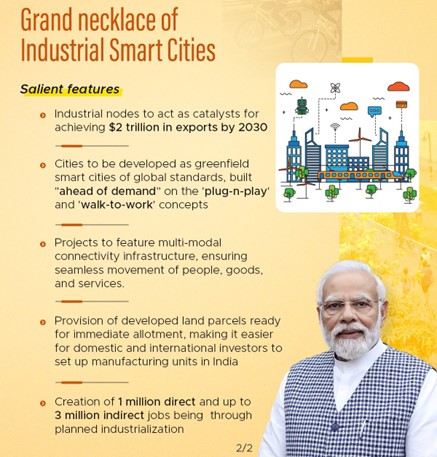Governance
Government Approved 12 New Industrial Smart Cities
- 05 Sep 2024
- 8 min read
For Prelims: Industrial Smart Cities, Smart Cities Mission, Centrally Sponsored Scheme, Sustainable development, Special Purpose Vehicle (SPV), Public-Private Partnership (PPP), Atal Mission for Urban, Rejuvenation and Urban Transformation (AMRUT), Pradhan Mantri Awas Yojana-Urban (PMAY-U)
For Mains: Challenges Associated with Industrial Smart Cities Development and Way Forward
Why in News?
Recently, the Union Cabinet, under the leadership of Prime Minister has approved the establishment of 12 industrial smart cities across 6 major industrial corridors in 10 states under the National Industrial Corridor Development Programme.
- The chosen cities for the industrial projects are in Uttarakhand, Punjab, Maharashtra, Kerala, Uttar Pradesh, Bihar, Telangana, Andhra Pradesh, and Rajasthan.
What is an Industrial Smart City?
- About:
- An Industrial Smart City is an urban area that integrates advanced technologies and data analytics to enhance the efficiency of industrial operations and promote sustainable development.
- These smart industrial cities aim to attract foreign investment, boost domestic manufacturing, and drive employment.
- Objective:
- The development of new industrial cities in India aims to strengthen the country's position in global value chains by providing investors with ready-to-allot land.
- It aims to integrate advanced urban concepts like 'plug-and-play' and 'walk-to-work'.
- Plug-and-play industrial parks offer ready-to-use infrastructure, enabling businesses to start operations immediately.
- "Walk-to-work" is an urban planning strategy that encourages people to live near their workplaces, reducing car use and promoting walking
- Road Map for Development:
- The cities will be developed under the National Industrial Corridor Development Programme (NICDP).
- NICDP aims to develop advanced industrial cities that can compete with the world’s top manufacturing and investment destinations.
- It is designed to foster a vibrant industrial ecosystem by facilitating investments from both large anchor industries and Micro, Small, and Medium Enterprises (MSMEs).
- The first industrial corridor, the Delhi Mumbai Industrial Corridor, was approved in 2007.
- The programme is implemented by the National Industrial Corridor Development and Implementation Trust (NICDIT) and the National Industrial Corridor Development Corporation Limited (NICDC).
- These industrial nodes will integrate residential and commercial setups, functioning as self-sustaining urban environments.
- The government plans to partner with Invest India (India's national Investment Promotion & Facilitation Agency) for marketing these projects.
- A Special Purpose Vehicle (SPV) will also be set up to implement the parks, with a 3-year completion timeline, depending on state cooperation.
- The cities will be developed under the National Industrial Corridor Development Programme (NICDP).
What are the Key Features of the Approved Industrial Smart Cities?
- Aligned with National Economic Goals & PM Gati-Shakti National Master Plan:
- The development of these smart cities aligns with the government’s goal of achieving USD 2 trillion in exports by 2030.
- The projects will be aligned with the PM’s GatiShakti National Master Plan, incorporating multi-modal connectivity infrastructure to enable seamless movement of people, goods, and services.
- This infrastructure is crucial for improving logistical efficiency and streamlining supply chains nationwide.
- The cities will be part of a ‘necklace of industrial cities’ along the Golden Quadrilateral, enhancing connectivity and industrial growth.
- Significance:
- These projects are designed to attract Foreign Direct Investment (FDI) from countries like Singapore and Switzerland.
- These cities are expected to generate around 10 lakh direct jobs and up to 30 lakh indirect jobs, with an investment potential of Rs 1.5 lakh crore.
- The cities developed under the NICDP will promote sustainability by integrating ICT-enabled utilities and green technologies to reduce environmental impact, while providing ready-to-allot land parcels to attract domestic and international investors, aiming to strengthen India's role in global value chains.
What are the Challenges Associated with Industrial Smart Cities Development?
- Technological Integration and Infrastructure: Upgrading outdated urban industrial infrastructure to support IoT devices, high-speed internet, and data centres demands significant investment and poses logistical challenges, especially in older cities.
- Data Privacy and Security: Ensuring the protection of vast amounts of data collected from smart devices against breaches requires robust security protocols and continuous monitoring.
- Funding and Investment: Securing substantial financial investment from public or private sources is challenging, requiring convincing stakeholders of the long-term benefits and Return on Investment (ROI).
- Public Acceptance and Awareness: Addressing citizens' concerns about privacy, job loss due to automation, and lifestyle changes through effective communication and education is crucial for the success of industrial smart city projects.
- Governance and Policy Issues: Navigating changes in local laws, regulations, and policies is time-consuming and politically sensitive, complicating the implementation of smart city initiatives.
Way Forward
- Regulatory Reforms: Simplify and digitise administrative processes, harmonise regulations across government levels, and enhance transparency in decision-making to improve efficiency, reduce business burdens, and build investor trust.
- Efficient Land Acquisition: There is a need to create land banks to streamline acquisition, ensure fair compensation to minimise disputes, and use innovative methods like land pooling to speed up the process.
- Sustainable Development: It is essential to conduct thorough environmental assessments, promote sustainable business practices, and invest in necessary infrastructure to support these efforts.
- Skill Development and Workforce Training: To address skill shortages in industrial parks, it is crucial to establish vocational training centers, collaborate with industries for tailored training programs, and provide incentives to encourage businesses to invest in employee development.
- Public-Private Partnerships: To maximise the benefits of industrial smart cities development, it is essential to foster public-private partnerships that share risks and rewards equitably while ensuring transparency and accountability in governance.
|
Drishti Mains Question: Q. What are industrial smart cities? Examine their relevance in urban development of India and enlist the challenges faced by them. |
UPSC Civil Services Examination, Previous Year Question (PYQ)
Mains:
Q. With a brief background of quality of urban life in India, introduce the objectives and strategy of the ‘Smart City Programme.’ (2016)





